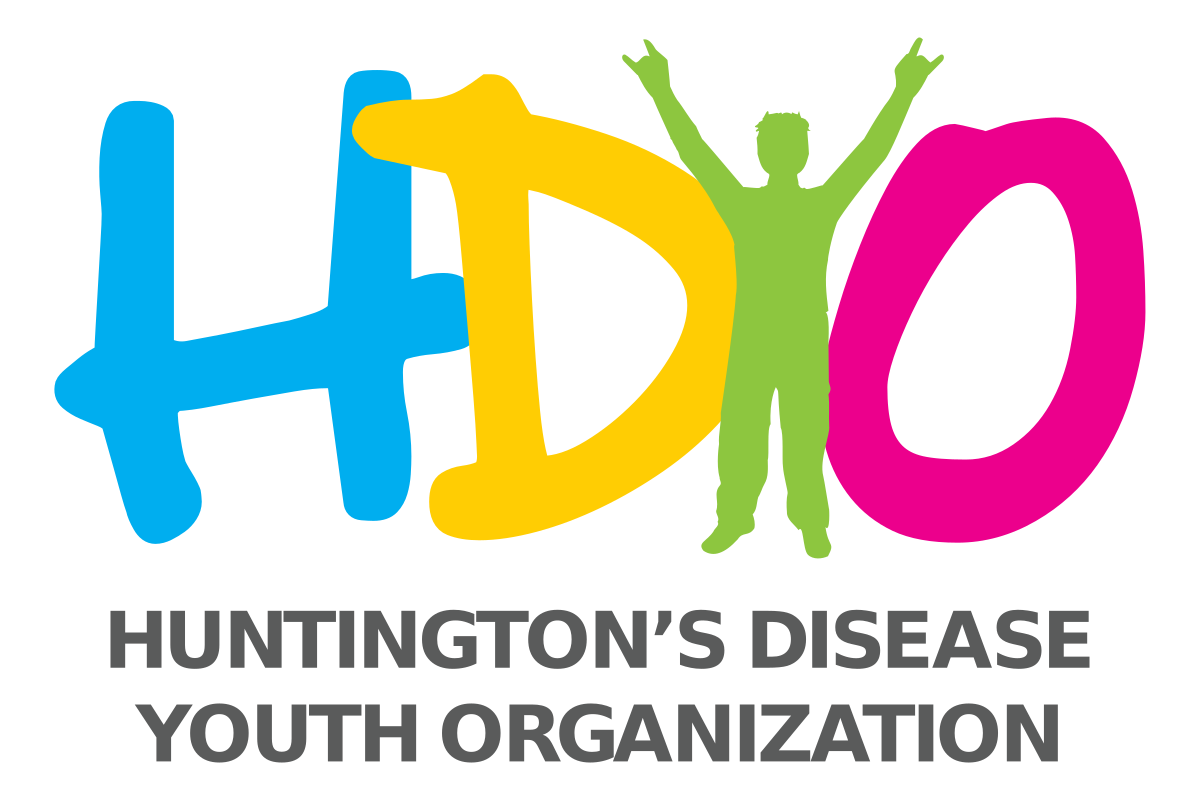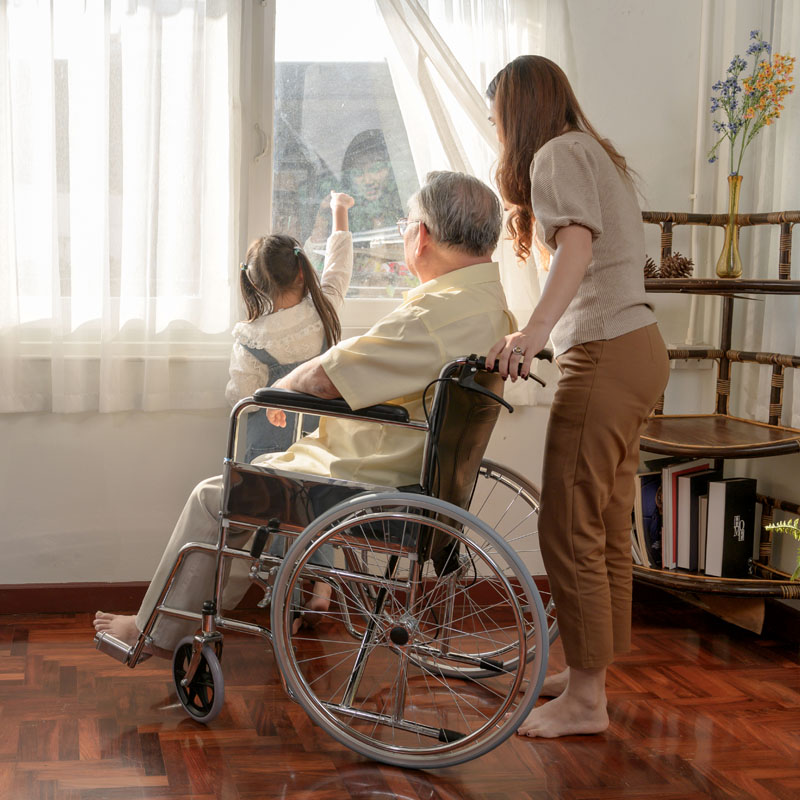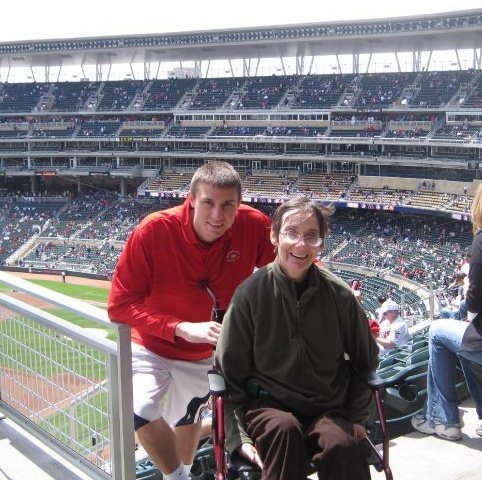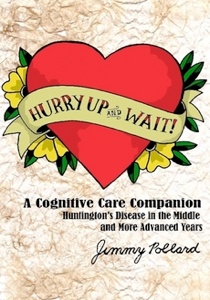Being a Young Carer
November 24, 2021

HDYO has more information about HD available for young people, parents and professionals on our site:
www.hdyo.org
Updated in 2023 by Education and Research Committees
As the disease progresses, a person affected with Huntington’s disease (HD) will gradually begin to need more care. As a result, young individuals in a family affected with HD may provide care for their loved one at some point in their lives.
Many young people find themselves taking on a caring role in a family with HD. However, becoming a young carer does not generally happen overnight, it is usually something that happens gradually over time. Many young people may not see themselves as a carer or will provide care to their loved one without realizing it.
'My mum was my dad's carer, but I used to help out with things around the house and if my mum wanted to go out I would look after dad by myself - I was only about 14 at the time. I didn't see it as caring; I just saw it as staying at home with my dad.' Tony
Other young people have a more permanent or official caring role and provide regular care for their family member - doing all the duties that (perhaps) the family members used to do, while also making sure that they are looked after and cared for.
Difficult life choices

Caring can have a big impact on young people's lives. One of the biggest impacts is the guilt felt by young people who are torn between caring for their loved ones and living their own life. Many young people feel guilty about leaving the person they are caring for. For example, when they are going off to study at a university, or planning on moving in with a partner elsewhere, or even something as small as going out for the day - all of these situations may cause a young person to feel a sense of guilt for not being around to help look after their loved ones with HD. Young people may end up feeling that they should not think about their own future, but focus on the person they are caring for.
'There are times when I wonder if I should put my plans on hold to do stuff for mum or even if I should move out at all. My mum has told me that if I put my life on hold or base future decisions solely on her that she'll be annoyed with me. She says I have to live MY life and do what's best for me but there are times when it's tough when I think about what the future may hold.' Jackie
It can be difficult for a young person to plan their future when they know in the back of their mind that they may be needed to help care for a loved one. However, it is important to remember that you have a choice about your future. While some young people ultimately decide to be a carer, you don't have to put your life on hold.
Looking after siblings
Young people may also have brothers or sisters that they have to look after since their HD-affected relatives may be unable to maintain a caregiver role. In a way, young people can end up becoming almost like a parent to their siblings during this time, doing all the jobs that the affected parent would normally do. This can be difficult for everybody in the family, especially for the siblings who take on the extra responsibility as they may feel that they have to be the 'stronger ones', setting a good example for their brothers and sisters. When a young person takes on a parental role, it may lead them to believe that they cannot show any weakness. They may think that their role is purely to be supportive to the rest of the family, often forgetting they deserve just as much support as the other members of the family.
Role reversal

This role reversal happens to many young people providing care in a family with HD. As the condition progresses, the young person begins to take on a more parental role in the family, filling the gap left as a result of the parent having HD. Also, as people progress with the condition they tend to become more 'childlike' in their nature, as they become more dependent on others, and this adds to the feelings of role reversal often experienced by young people.
'When I was 12 my dad used to take me to the football games. By the time I was 19 it was me taking my dad to the games because he had progressed so much with Huntington's disease' Brian
'Looking in the mirror' syndrome
Caring for someone with HD can be difficult, tiring and stressful. It can also be emotionally challenging if you know that you are at-risk of HD or inherited the disease-causing gene. HDYO calls this the 'looking in the mirror' syndrome.
'It became really hard for me to care for my father who had Huntington's disease. I kept looking at him with his symptoms and thinking "that will be me in 20 years". It was really difficult to deal with.' John
The 'looking in the mirror' aspect is genuinely a difficult emotion to overcome. If this is something that worries you then perhaps the being at risk section will be able to help.
Feeling guilty as a carer
There may be times when you feel guilty as a carer. In some cases, you may feel that you were not there when needed. You may also experience guilt for becoming upset at your family member with HD because they were making things difficult and it was causing you some stress.
'Sometimes my mum would be so difficult to care for that I would get extremely stressed out and usually ended up shouting at her. Afterwards I would feel so guilty because I knew it was not her fault, it was the Huntington's disease. But it was hard not to shout at times and usually to make up for it I would give her a hug as an apology. It made me feel better too.' Abbey

Neither of these situations is anybody's fault. Remember that it is HD causing the person to be difficult and they usually cannot control their actions. However, you also need to remember that you are a human and if something causes you stress, then it is only natural to want to let those feelings out. Try not to feel too guilty if you lose your temper from time to time. You can always apologize and explain why you were stressed.
The person being cared for taking things out on the carer
People with HD can also become frustrated or upset and take out their feelings on their carer. This is often because they feel comfortable around you as you are a family member or someone they trust. Try not to take any outbursts personally and remember outbursts are a common symptom of the disease. If you do become angry or frustrated with the person who has HD, it can be a good idea to walk away, if possible, and come back when you are calm enough to handle the situation.
How do people with Huntington's disease think?
People's thought processes change when they are affected by HD. This is because the disease causes damage to the brain. Understanding the condition and how people with HD think can really help when trying to care for affected people. Jimmy Pollard has written a book about the way people with HD think and strategies for caring for them. If you want to learn more about his book, which is available in many languages, click on the image.
Jimmy's book explains how people with HD think. However, we provide some of the main points from the book below to help you understand the thought process of someone with the condition. It is written from the viewpoint of someone with the disease.
I have Huntington's disease - this means:
- I like my own routine
- I do one thing at a time
- You need to get my attention and then tell me what you want
- Give me time to answer - don't repeat what you said before I answer back, wait for me to reply
- I don't know how to wait, so if I need something I need it now
- My brain gets stuck on thinking about important things - so I repeat the same words a lot
- I can still have fun and enjoy things!
- It can all become 'too much' at times
Keep in mind...
There can be times when caring for a family member can become too much. You may feel that you cannot continue, or you need a break. There is nothing wrong with feeling this way. In fact, it is very common. The impact of caring for a family member with this disease is not just felt in the home environment. Many young carers find school or work more difficult, as well. A young carer's grades may begin to fall at school, or their productivity and reliability at work might begin to drop. Sometimes, young people leave school or work altogether, as they just can't cope with the demands being placed on them. If you feel your education or career is being affected by caring for someone with this disease, it is important to speak with your family, your school or work place or to a professional about this issue for support. Also, HDYO is here to help and support you, so please do not hesitate to contact us.
Making time for yourself
Caring for a loved one can heavily impact a young person's social life too. Young carers may find they have less time to spend with friends, given their responsibilities at home.
'I remember during my late teens, when my friends were all going out at the weekends and enjoying themselves, I would have to stay at home, or at least be back by a certain time in order to put my dad to bed.' Kevin

Try not to deny yourself opportunities to have a break and spend time away from your family member. It is important that you don't overload yourself. You can't help others if you are not in a healthy mindset. Look after yourself and seek support if you need help. Time away is not always an option for everybody. For example, you may be the only caregiver available to look after the family member. However, if possible, make sure to listen to your feelings and have some time for yourself when things become too much
It might be useful to organize a regular time slot for yourself where you can relax. Perhaps, you could ask a relative or friend to look after your family member for a night every week/month, or maybe you could have alternate care shifts with a sibling. There may be the option of having a paid carer come in for a few hours a day/week to give you some time off to relax. Time away can be very beneficial to both your and your family.
Enjoying time together
Sometimes it can be easy to forget that people with HD can still enjoy life. Being a carer doesn't need to be hard all the time. You can create some good memories together, as well. For example, you may enjoy spending time outside, taking a walk, cheering on your favorite sports team, or attending a social event together. All these things can make a world of difference to both your and the person with HD.
'There is nothing more rewarding than seeing my mums face brighten up when we go out and do something nice, it's normally something as simple as going for a little drive in the car to the countryside so that she can see flowers and wildlife that she loves. It only takes an hour but it leaves me with a warm and happy feeling knowing that she has enjoyed herself and it has brightened her day.' Chantelle
Support
Caring for somebody with HD can be difficult. You may find it emotionally and physically draining. If you get to a stage where you need help, it is important that you are not afraid to ask for support. There are many resources that could make your job as a carer easier and less stressful.
What support is available?
HDYO: HDYO can help in various ways. We are able to:
- Connect with other young people via our programs
- Answer any questions you may have
- Serve as a point of first contact for many resources available via info@hdyo.org

National Huntington's Disease Organisation: Your national Huntington’s disease organization can connect you with available support in your area. They may even be able to suggest conferences and events for carers from HD families and camps you could attend when you need time away. You can find a list of the national Huntington's disease organizations here.
Young carer organisations: You may live in an area that has young carer organizations. Although not specific to HD, these organizations are there specifically to support young carers. Again, you need to check whether there are any organizations like this in your area, your national Huntington's disease organisation should know.
Respite care: In respite care, the person with HD goes into a care home or hospice for a short period of time to allow the family to take a break from their caring roles. Some areas may have respite carers that will look after the person with HD in their own home while the rest of the family take a break. There may also be nearby facilities that allow the family to enjoy time off while their affected relative is cared for on-site. This option is not available everywhere so you will need to check with your national Huntington's disease organisation to see whether it is an option for you.
Care support: Some families receive support from paid, home health carers. This can give you a break from caring while knowing your loved one is being looked after at home. Again, this type of support isn't available everywhere, but if you contact your national Huntington's disease organization they can give you more information about this service.
Financial support: The governments in some countries provide financial support for people who are doing unpaid caring for a family member. This can address financial hardships when a caregiver is unable to work. The amount of financial support people receive varies by many factors including your location, the hours you spend as a caregiver, and age.
Care homes: Even with various support networks, it can still be a struggle to look after someone with HD. As the condition progresses, more care is generally needed. There may be a point when the family feels it is time for the person affected by HD to move into residential care. This can feel like a massive step to make and one that often leaves family members feeling guilty. However, there are care homes out there that specialize in HD and your family member should be well looked after there. You can visit them regularly and still spend quality time together.
Your national Huntington's disease organization can help if the time for finding a suitable care home comes. However, not everyone with HD goes into a care home. Some families are able to look after their loved one at home for many years. It depends on each family and their situation.




